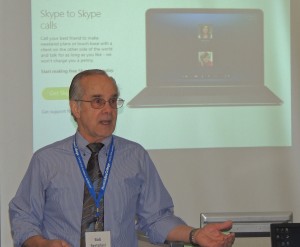RVC program takes mystery, fear out of technology for older adults
By Lynne Conner For Chronicle Media — February 24, 2016 Love it or hate it, technology and its ever evolving devices for communication are here to stay.
Love it or hate it, technology and its ever evolving devices for communication are here to stay.
The millennial generation has grown up with cell phones, computers and the Internet and each new iPhone launch is met with the excitement of a rock concert. But for some adults in the over 50 age bracket, new technology looms ominous on the horizon leaving in its wake, feelings of apprehension, bewilderment and intimidation.
Enter Bob Bertolasi, John Majernik and Rock Valley College’s Center for Learning in Retirement (CLR).
The CLR program offers a wide range of educational and social opportunities for people aged 50 and over. Classes and trips are staffed by volunteer facilitators who have an expertise in their given field. Bertolasi, a retired corporate trainer for electronics and engineering, and Majernik, a retired educator, facilitate computer classes for CLR on how to use Microsoft Word, PowerPoint, the Internet, Skype, email and other related topics.
According to Majernik, the CLR program has added more selections to its roster of computer classes in recent years to accommodate a steady interest in the subject.
“I’d say that we probably started out with four or five computer topics at the most and now we must have a dozen different topics on computers that are taught … over the course of a year,” he said. “Yes, there’s been an increase in the types of classes and a demand for new classes as computer technology continues to evolve.
The reasons people take computer classes through the CLR program are varied. But Bertolasi sees the classes as a way for seniors to better understand a sometimes confusing and daunting subject within the confines of a supportive and encouraging environment.
“We get all kinds of learners in our computer classes,” Bertolasi said. “We get the ‘bulls in the china shop’ and we get people who can’t wait to pounce on the keyboard. We get those who have no idea what they’re doing and we get those who are very educated and intelligent and just want to learn how to finesse something.
“We get some people who are scared to even touch the keyboard or turn the computer on. They don’t know what they’re looking at; they don’t know why they’re looking at it. They just know that their son or daughter or grandchild told them they need to learn about computers.”
Majernik said that the majority of seniors taking the classes approach the subject with a positive attitude.
“Most of the people come to class with an open mind and they want to learn,” he said. “We try and make them realize that it doesn’t matter what they know about computers, they’re going to get something out of the class. They’re not going to become an expert, but we’re going to move them up and along. Most people then decide that they want to take another computer class, because they want to find out more. As they get more comfortable with the computer, they’ll take more classes.”
Marilyn Spielman, of Rockford, recently attended a class on how to use Skype. She is interested in staying connected to family members living abroad.
“Our daughter is on a teacher exchange program with her family in France for a year,” she said. “We have grandchildren who are a year old and as grandparents, we would not like to disconnect from that situation, we would like to stay connected with family as often as we can. We are all excited about the different stages that our grandchildren are going through and by learning how to use Skype, we can be a part of their daily lives despite the distance separating us.”
Fostering a closer relationship with family members living on the East Coast, the West Coast and in Texas are among Don Dexheimer’s reasons for learning how to use Skype.
“This class is helpful in learning to communicate in multiple, modern ways. Communicating with different generations requires understanding which is the best way to stay in touch with the children, the grandchildren, nephews and nieces,” he said.
Dexheimer has found that coordinating his yearly family reunion becomes easier when multiple methods of communication are utilized.
“Typically, we’ll have anywhere from three to four generations represented (at the reunion),” he said. “As we organize this event, it’s necessary to find which means of communication, text, email, phone or Skype, is going to be most effective in reaching our family members.”
Dexheimer, a pastor from Machesney Park, is also hoping to use Skype, texting and emails as a way to better engage younger members of his congregation in church events.
Love it or hate it, high tech innovations are here to stay. Seniors empowered by computer training through CLR classes can use these skills to bridge family generations and continue on the path of life-long learning
— RVC program takes mystery, fear out of technology for older adults —



